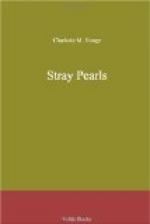I felt as if it were all a dream, and when presently my brother came and took my hand, I cried out: ‘Oh, wake me! Wake me!’ And when he burst into tears I asked what he meant.
Looking back now I can see how very kind he was to me, though I made little return, being altogether bewildered by the sudden strangeness of my first grief. Poor M. de Solivet! he must have had a heavy charge for Armand d’Aubepine was altogether frantic with grief, and did nothing to help him, while I could not weep, and sat like a statue, hardly knowing what they said to me. Nay, when the tidings came that my father had been killed in the battle of Marston Moor three weeks before, I was too dull and dead to grieve. Eustace had written to my husband in order that he might prepare me; I opened the letter, and all that I can remember feeling was that I had no one to shield me.
I had but one wish and sense of duty at that moment, namely, to carry home those dear remains to the resting-place of his father in Anjou, where I hope myself to rest. It was of no use to tell me that all places would be alike to my Philippe when we should awake on the Resurrection day. I was past reason, and was possessed with a feeling that I would be sacrilege to leave him among the countless unnamed graves of the wounded who, like him, had struggled as far as Brisach to die. I fancied I should not be able to find him, and, besides, it was an enemy’s country! I believe opposition made me talk wildly and terrify my brother; at any rate, he swore to me that the thing should be done, if only I would return to Nancy and to my child. I fancied, most unjustly, that this was meant to deceive me, and get me out of the way while they buried him whom I loved so much, and I refused to stir without the coffin.
How my brother contrived it, I do not know, but the thing was done, and though I was but a cart that carried the coffin to Nancy, I was pacified.
At Nancy he arranged matters more suitably. Here M. d’Aubepine, in floods of tears, took leave of me to return to the army, and M. de Solivet, whose wound disabled him from active service, undertook to escort me and my precious to Anjou.
It was a long tedious journey, and my heart beats with gratitude to him when I think what he undertook for me, and how dreary it must have been for him, while I was too dead and dull to thank him, though I hope my love and confidence evinced my gratitude in after life.
My dearest went first in a hearse drawn by mules, as was also my large carriage,—that which we had so joyously bought together, saying it would be like a kind of tent on our travels. I traveled in it with my child and my women, and M. de Solivet rode with our men-servants. Our pace was too slow for the fatigue to be too much for him, and he always preceded me to every place where we halted to eat, or where we lodged for the night, and had everything ready without a thought or a word being needful from




